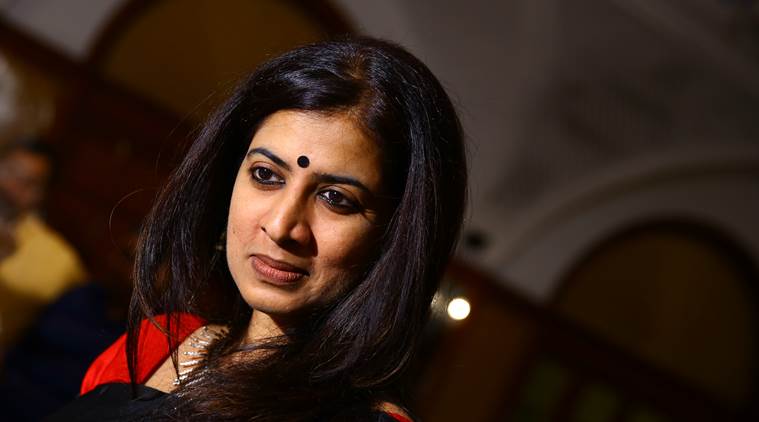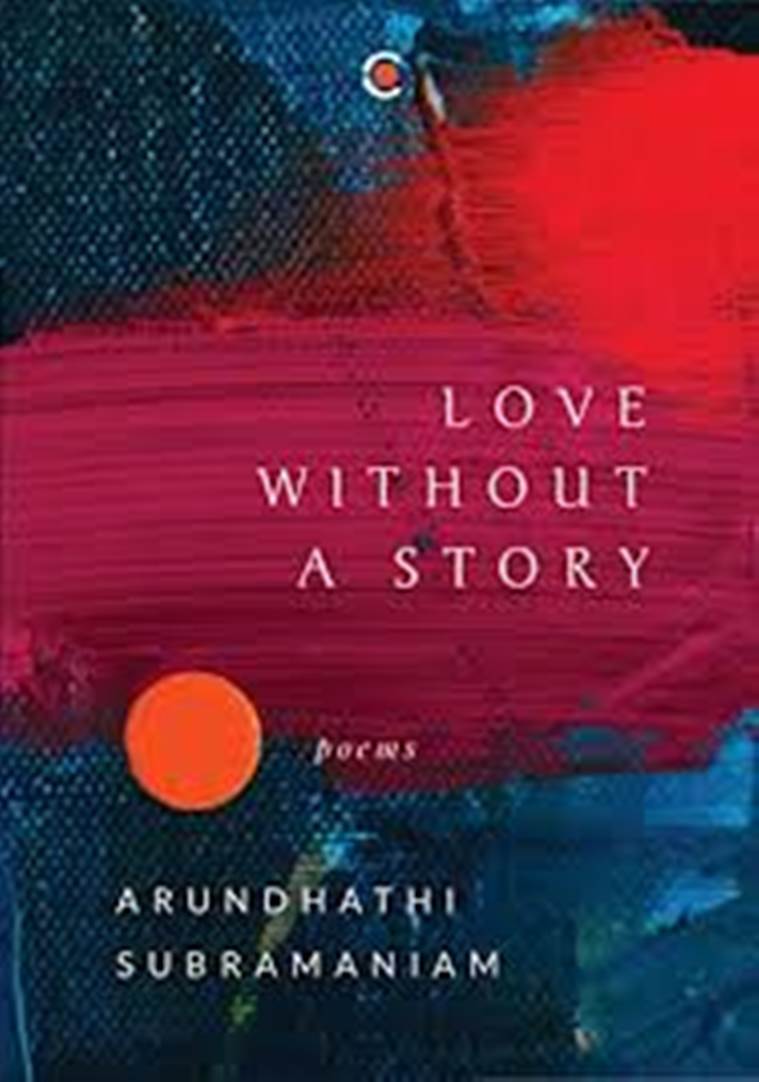
Your new volume of poetry is called Love Without a Story (Context, Rs 499). But does love ever come without one?
No, for me, it didn’t. But love did stay after the story was done! We learn so much about love through stories — in books and movies, myth and folklore. And, of course, our stories. But what happens when the story collapses (and they do collapse eventually)? When your story collapses, you’re left. And a certain pause remains. The challenge is to allow that pause to deepen — not be in a hurry to fill it up with more words, more stories. It’s a spaciousness with a certain voltage. And if you let it breathe, it doesn’t turn into resentment, rancour, self-pity or complaint. That’s what interests me more and more: the inner condition that doesn’t have an opposite. I suppose you could call that love. But it’s not a gooey, sentimental love. Just a gaze relatively unstained by bitterness, nostalgia or neediness. A love that isn’t tethered to plot, that’s managed to escape narrative. And then, suddenly, you begin to see in a small, flickering way that freedom may not be at loggerheads with love — that intimacy and spaciousness can go hand in hand.
In this volume, the theme of intimacy spans a range of relationships and experiences. I am curious to know about the time frame of the poems, given the equanimity they reflect. Are these reflections of an older woman, who is ‘so light/ She can finally/take herself/ seriously’?
All these poems were written in the past five years.The figure in the poem who is ‘so light/ she can finally/ take herself seriously’ is Avvaiyar, the wise woman of Tamil literature. The figure of the female vagabond or mendicant has been recurrent in my poetry. But Avvaiyar is more than that. She’s the ‘old woman’ too. She reflects my growing interest in the figure of the crone. What does this figure represent to us, particularly in an age obsessed with youth and beauty? Unlike the great woman mystic, Akka Mahadevi, Avvaiyar doesn’t drop her clothes. What Avvaiyar drops, instead, is the need to accumulate. She sheds her youth, but I see her as also shedding other things: the need to please, to impress, hoard, be immortal, the need to freeze her legacy, leave an imprint on the world. She represents a wisdom that isn’t heavy, solemn and sententious. If age can mean that kind of clarity, then, perhaps, the prospect of growing old wouldn’t be so alarming! I’m no Avvaiyar, but yes, there is less neediness and more of an inner balance in my life than before. And it’s been hard-won.

What part of speech is love to you?
Good question! I guess the correct answer would be that it’s a verb, not a noun? But if I were to offer you a personal take on it, I’d describe love as a certain inner climate, a condition of fullness, aliveness. A climate in which no crevice of self is suppressed or sidelined on the grounds that it is dark, festering, messy or inconvenient. Love is a kind of deep, attentive listening. I have a poem in the book called ‘Let Me Be Adjective’. There’s a line there that says: ‘I suppose I’m asking/ like the old bards did,/ to be your garland.’ But this isn’t about being servile and adoring. It isn’t merely decorative. It is ‘just a little tart, a little contrary/the kind that isn’t always allowed within walled gardens’. That’s my kind of love. Not without salt, not without angle, but tender nonetheless!
We often speak of finding one’s voice as a writer. But we are never quite the same person over time. How does a poet arrive at a voice of one’s own?
Finding your poetic voice is vitally linked to growing into yourself. And, of course, growing into yourself is a lifelong process, so you find your voice only in deepening installments. To some degree, you know you’ve found a timbre that’s your own when you find that authenticity and artistry aren’t running on parallel tracks. You find them aligning more and more. We spend so much time trying, unconsciously, to disown or deny who we are. I’m not talking about concealing ourselves from the world; that could be a valid literary strategy. I’m talking about concealing ourselves from ourselves. The kind of poetry that emerges from a lack of ease with the self can be clever and dexterous, but it is constrained. To give you an example, I have always written free verse. But it is in the past decade that I’ve found that my earlier free verse wasn’t anywhere near as free as I thought it was! I know the timbre of my voice much more now, the idiosyncratic way in which my poetry breathes. I’m more capable of standing behind a poem, less inclined to stand in front of it.
Has how you write changed over time?
Looking back, I realise that even while writing earlier about the city, relationships, gender, cultural politics, dharma or rage, I have always been circling the preoccupations of love, loss, time, quest and the existential journey. It’s just that each book inflects these themes differently. What has changed is how I write. I feel the craft is less tense. I’m more aware of my formal choices than before. I understand the rhythms of my free verse a lot more. The poems are different on the page: dense units of verse have now given way to more perforated language. The poems reflect the way I see language today — a verbal art that walks a fine line between gravity and flight, inevitability and surprise. That is the hallmark of the lyric poem for me.
You grew up in Bombay in what was the golden age of Anglophone poets. How did it impact your writing?
It gave me the sense of an ecosystem. Even today, for many young poets — despite the hubbub on social media — poetry is a lonely activity. Being part of the Poetry Circle — a group of poets and poetry lovers who met every fortnight in south Mumbai to read, critique and discuss poetry — offered a precious sense of community in my formative years. Nissim Ezekiel was a generous mentor figure to many of us, and, later, meeting poets like Adil Jussawalla, Gieve Patel and Imtiaz Dharker offered the sense of belonging to a breathing, pulsating literary context. Also knowing that one inhabited the city of Arun Kolatkar, Dom Moraes and Dilip Chitre, or having Eunice de Souza as professor in my undergrad years, certainly shaped the poet that I am today. I don’t think there was or is a unitary ‘Bombay’ poetics, but there was the sense of being heir to a living history of Anglophone poetry.
How has your spiritual journey shaped your writing?
Thanks to a father with an omnivorous appetite for literature, I grew up in a book-lined home. Alongside fiction and history was a great deal of Eastern philosophy. For some reason, it was the philosophy that excited me. The love of poetry also began in my childhood. Later, in my 20s, my fascination with philosophy deepened into a much more self-implicating spiritual quest. What connects poetry and the spiritual journey? The fact that both are about wonder, about turning abstraction into visceral experience, about asking what the poet Ruth Padel calls ‘the bedrock questions’. Both nourish each other. My love of poetry never allows me to trust a de-sensualised spirituality; my spiritual quest insists on a certain authenticity in my practice of poetry.
Your poems reflect a fascination with Indian religious traditions but also a distaste for dogmatism. Can they coexist?
The two aren’t antithetical. They go together. I am drawn to Indian spiritual traditions for this very reason. They don’t invite us to certainty; they invite us to experience. The more dogmatic strains we see today are deeply unfortunate. Thankfully, they have nothing to do with the molten inner core. Isn’t it wonderful to think that these haven’t been smothered by fundamentalist rhetoric and hate speech? The contemplative and ecstatic traditions are alive and kicking. As I say as a preamble to my poem, ‘How Some Hindus Find their Personal Gods’, the wonderful thing about the ishta devta — the personal god — is that you can choose your own among 33 million gods and goddesses, invent one if you don’t find one to your taste, and dispense with the lot if you are so inclined, and still continue on your spiritual quest.
But does religion in contemporary India have space for such scepticism?
The real spiritual journey is never about being a sentry or soldier; it’s not about flag-waving and chest-thumping. It’s about wonder, quest, bewilderment. The journey of faith is routinely potholed with questions and doubts. If anything, you have to unlearn rather than learn. So, scepticism is entirely understandable. Let’s not confuse the existential journey with the external crust of beliefs that people or politicians call religion. And let’s not confuse dogmatic disbelief with liberalism either. In times of flux, people try to freeze reality in various ways, either into doctrinaire faith or doctrinaire ideology. An inner journey has nothing to do with gatekeepers, priests or even philosophers. It’s to do with yourself.
There’s a host of poets on social media now. What does that mean for the genre?
Democratisation is generally good news. It’s like offering a mike to every bathroom singer! But there are concerns. Most of all, there is an absence of self-critique. Poetry takes work. It isn’t just about inspiration and spontaneity. It’s also about craft, rigour. The more you deepen your engagement with the form the more you realise how much work it takes. The other concern is about readers. It’s amazing how many aspiring poets have never bought a book of poems in their lives!
You do a lot of readings of your work. How does your speaking voice interact with your writing voice?
It’s an important connection. A poem lives on the page but reading it aloud is a natural extension of its life. For me, poetry is a verbal art — when you allow your voice to trace its contours, savour its textures, sink into its pauses, it comes alive differently. Some readers prefer to read it on the page, I understand that. But public readings have their importance, too. I’ve met many audiences who say that readings inspire them to return to poetry.